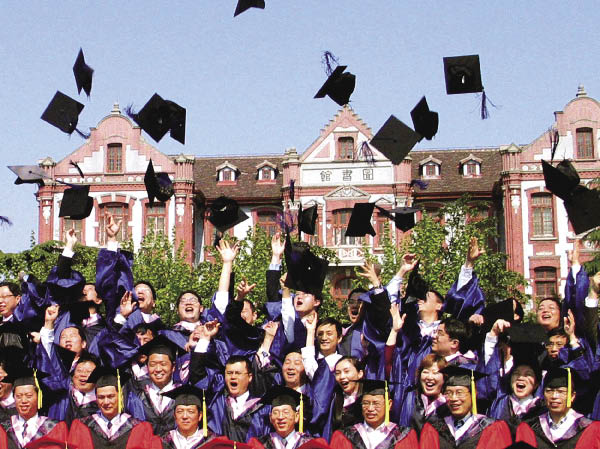| High-end Training Services Target the Rich
By staff reporter ZHOU CHANG
Since the policy of "letting some people prosper before others" was implemented following China's reform and opening-up in 1978, a flourishing middle class has arisen in the nation. People in this income bracket, with relatively abundant earnings and hefty purchasing power, can afford to raise the educational level of themselves and their kin. High-end training services have emerged to meet the demand.
 |
| The first high-end training programs that made their way into China were the EMBA programs, which were designed for senior managers and entrepreneurs. China Foto Press |
Demand for Business Skills
The country's burgeoning population, along with its unprecedented economic development, has accelerated the expansion of new wealth in the nation, as compared with others around the world. According to the Asia-Pacific Wealth Report jointly issued by Merrill Lynch and Capgemini in October 2009, the percentage of High Net Worth Individuals (HNWI) pegged at above US $1 million in China dropped by 11.8 percent to 364,000 in 2008 but that figure still surpassed the UK. Despite the global economic turndown, China took fourth place in the world for HNWI. Those with an annual income of over RMB 150,000 in China stand at nearly 76 million, a staggeringly large figure for any country.
Now the people that make up that group have begun to look for ways to further their assets growth through training. The aim is to broaden their professional perspectives, to better operate their own private businesses, and to learn appropriate deportment while interacting and negotiating with their foreign and domestic counterparts. They are trying to find a balance between their work and private lives, in an effort to raise the quality of their life. Naturally, they are also keen on helping their children get an edge in life through skills training. As of now, the business training industry in China has reached RMB 50 billion and continues to grow at a rate of 30 percent annually, among which high-end training services hold a dominant position.
Brisk demand has spurred on many entrepreneurs to look into these business opportunities, including schools of higher learning with existing business or management faculty resources. Running training classes repurposes these resources. For example, business colleges conduct private international investment or finance training sessions or money management classes; art colleges open calligraphy or painting classes to the public; and schools of fashion launch personal image building courses.
The first high-end training programs that made their way into China were the EMBA (Executive Master of Business Administration) programs, which were designed for senior managers and entrepreneurs. Over the years, they have steadily attracted the elite from a wide range of sectors, including business and trade, manufacture, finance, telecommunications and real estate. Many trainees have made the annual Forbes China Rich List.
Along with providing broader professional perspectives, such programs also serve as an exclusive club for participants to build social networks. The Wuhan University EMBA Training Center established an alumni association that grants its members full management support from the EMBA Center long after they graduate. Zhao Hanyu, a member of the association, told China Today: "Such alumni-based relations seem to be more 'dignified' than straight business associations, creating a more natural space to form mutually beneficial relationships in the future."
The 46-year-old Jin Li gave up her career to become a full-time housewife, because her husband's income was high and quite stable. However, after awhile an emptiness grew in her without something to do each day. She decided to enroll herself in an Elegant Women Training Class, which not only helped to restore her passion for life but also indirectly improved the life of her husband and son. She has learned to prepare a traditional cup of tea to help her husband relax after a long day's work, and tutor her son in classical Chinese prose. "I am quite satisfied and happy with my current life," admits Jin Li.
| 